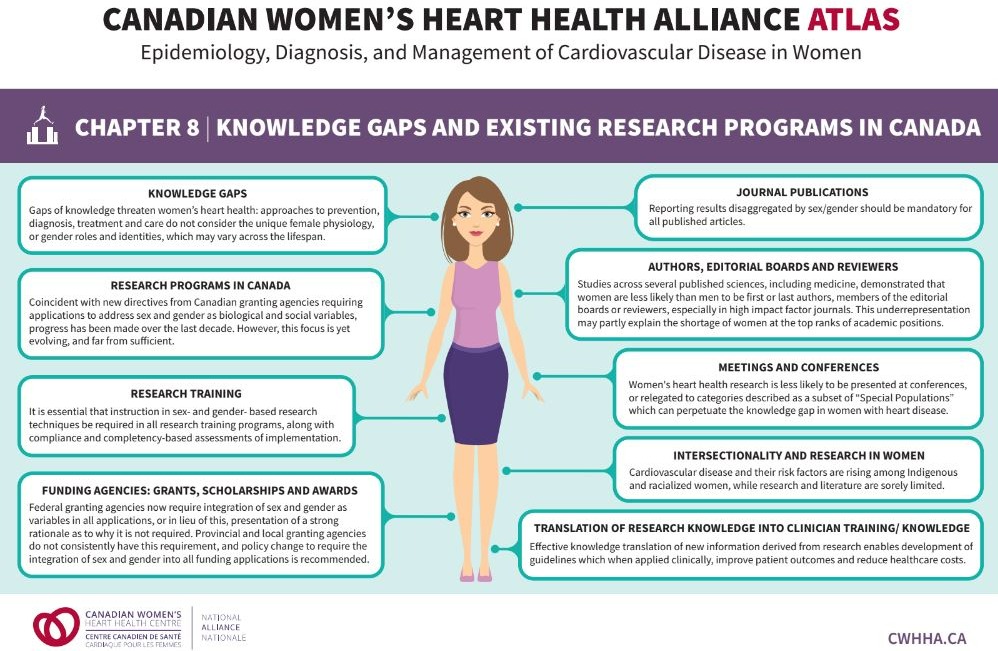Driving Change for Women in Research
Français
Women are under-represented in research
Despite the fact that women make up just over half the population, 2/3 of heart disease clinical research focuses on men.
Help us change these statistics by:
- Increase the representation of women in research.
- Require the inclusion of sex/gender AND racialization considerations in research protocol methodology, results analysis, and discussion, for all levels of research, including registries.

Participate in Research
Explore research opportunities across Canada and learn how you can join a study as a participant.

Promote your Research
Researchers and scientists: submit your study and registry details to be included in our online research catalogue.

Collaborate on Projects
Interested in contributing as a patient partner or seeking collaboration on a grant submission?
As a result, strategies used to identify and treat heart disease are primarily based on data from middle-aged, white, male subjects.
Clinical guidelines are based on research evidence. Therefore, medical decisions for women are being made based on research evidence about how heart disease is displayed in men.
Why were women not included in the research? The following are some of the reasons provided:
- Safety concerns: Women between the start of menstruation and menopause could potentially be pregnant and were excluded to prevent potential harm to the fetus.
- Hormone fluctuations: Researchers avoided using female animals as the hormone changes confounded results.
- Lack of participation in research.
It has been reported that it is more difficult to find women willing to volunteer for research studies, partly due to women's significant roles and responsibilities in other facets of their lives.
This is a problem because without women participating in research studies, there will continue to be limited insight on how heart disease impacts women differently.
Heart and Stroke Foundation of Canada. 2018 Heart report: Ms. Understood. 2018.
The Canadian Women’s Heart Health Alliance is driving change by:
-
Creating an online platform for researchers to promote their research, and for the public to find opportunities to join research studies.
-
Launching a Research and Knowledge Generation Theme with the goal to maximize research impact and build a diverse, collaborative, and sustainable network of researchers, clinicians, trainees, patient and community partners, working together to improve knowledge generation regarding cardiovascular health for women in Canada.
-
Becoming the Canadian Women’s Cardiovascular Health Hub within the National Women's Health Research Initiative: Pan-Canadian Women's Health Coalition. The Coalition will be composed of hubs across Canada linked through a coordinating centre that will work together to maximize the visibility and impact of women's health research and practice in Canada.
-
Publishing a living document on the current state of cardiovascular disease in women in Canada, known as the ATLAS. Within this collection of 9 chapters, published in the Canadian Journal of Cardiology Open, Chapter 8: Knowledge Gaps and Status of Existing Research Programs in Canada summarizes the existing education and research on cardiovascular disease in Canadian women, knowledge gaps to guide future research; and recommends prioritizing women's heart health in research, leading to systemic changes in education and public health policies.
References
- https://www.heartandstroke.ca/women/the-research
- The Canadian Women’s Heart Health Alliance ATLAS on the Epidemiology, Diagnosis, and Management of Cardiovascular Disease in Women — Chapter 8: Knowledge Gaps and Status of Existing Research Programs in Canada. Clavel, Marie-Annick et al. CJC Open, Volume 6, Issue 2, 220 - 257.
- https://cihr-irsc.gc.ca/e/53096.html, Date modified: 2024-03-07
- Canadian Women’s Heart Health Alliance| Volume 6, ISSUE 2, P220-257, February 2024, CJC Open| Volume 6, ISSUE 2, P220-257, November, 16, 2023
- Stacey Matthews, Samantha Cook, Tim Clayton, Sarah Murray, Rochelle Wynne, Julie Sanders, Factors affecting women’s participation in cardiovascular research: a scoping review, European Journal of Cardiovascular Nursing, Volume 23, Issue 2, March 2024, Pages 107–114, https://doi.org/10.1093/eurjcn/zvad048



